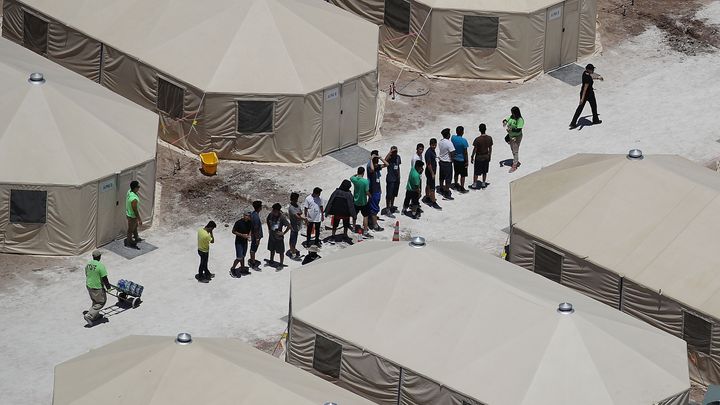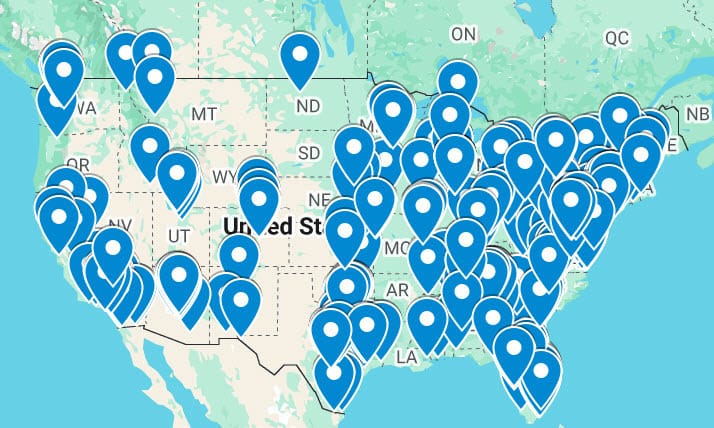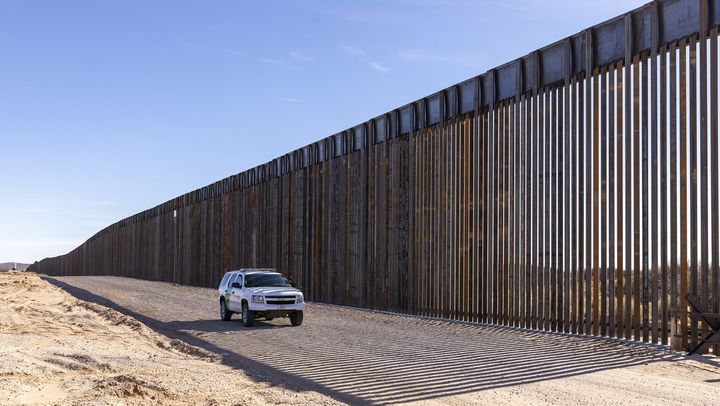A new report from the Inspector General of the Department of Homeland Security (DHS) warns of “dangerous overcrowding” and “prolonged detention” at several Customs and Border Protection (CBP) migrant processing facilities. Photos in the report show cells and pens packed with immigrants detained in unsanitary conditions. Lawyers and members of Congress who were able to enter the detention centers recount seeing immigrants without access to showers, wearing soiled clothing, being fed old, frozen food, and even some whom a CBP officer told to drink out of a toilet bowl.
DHS said in its own report that it is intentionally creating squalid detention conditions to act as a deterrent for prospective migrants. Others say that cruelty is the point.
When migrant children manage to survive days and sometimes weeks in CBP holding cells, their nightmares are far from over. CBP hands processed children over to the Department of Health and Human Services, which either places them with relatives in the U.S. or sends them to one of many privately operated child shelters. In 2018, the Trump administration instituted new, strict qualification requirements for adults seeking to sponsor immigrant kids, causing the shelters to burst at the seams. After months of public pressure, the administration returned to the previous rules for sponsorship, but many shelters are still too crowded.
A Sludge review of contract data as of June 30 has found that the federal government has spent nearly $3.8 billion on ongoing grants and on contracts initiated since Donald Trump became president related to “unaccompanied alien children” (UACs), or undocumented immigrant kids who crossed into the U.S. alone or were separated from adults—family or otherwise—after entering the country.
The majority of the grants for UACs came from the Department of Health and Human Services (HHS), which houses the Office of Refugee Resettlement, the division that manages the UAC program. Much of the grant money went to nonprofit shelter organizations, while some contracts from HHS and from the DHS’s Immigrations and Customs Enforcement (ICE) paid for-profit businesses for transportation, health care, tent construction, and other services.
The biggest recipients of government funding include top nonprofit shelter companies such as Texas-based Southwest Key Programs ($1.5 billion) and BCSF Health and Human Services ($659 million million), as well as for-profit businesses such as security firm MVM ($213 million) and shelter operator Comprehensive Health Services ($292 million), a subsidiary of the company that counts former Trump DHS Sec. John Kelly as a board member.
Use the interactive map to view UAC contractors and where they’re headquartered. Hover over the marks and contractors’ names will appear after a momentary delay.
Allegations of Abuse
In recent years, young immigrant detainees have made thousands of sexual abuse allegations against other detainees and UAC shelter workers. U.S. senators noted that many of the complaints weren’t properly investigated, leading them to demand that the HHS inspector general open an investigation.
Southwest Key Programs, by far the biggest UAC vendor with nearly $1.5 billion worth of ongoing grants to detain children, was forced to close an Arizona shelter last year because staffers were accused of physically abusing three kids, and it had to close two more after the company failed to provide proof that its employees met background check requirements. Also in 2018, Southwest Key staffers were charged with sexually assaulting immigrant children.
[Related: Who Is Making Money From CBP in Your State?]
And that’s not all of Southwest Key’s problems. A New York Times report suggested that former president and CEO Juan Sanchez and other executives were stockpiling government money and self-dealing, causing the Department of Justice to investigate. In March 2019, amidst increasing scrutiny, including over the nearly $1.5 million in total compensation he received during the 2017 fiscal year—far more than any other nonprofit shelter executive on the government’s payroll—Sanchez resigned.
The South Florida-based Homestead Temporary Shelter for Unaccompanied Children, the largest UAC shelter in the country, is run by Comprehensive Health Services and has been home to several child sexual abuse allegations. As of May 30, Homestead, which operates on federal property and is not licensed by the state of Florida, was detaining 2,240 children.
The shelter is reportedly extremely crowded and noisy, and detainees rarely, if ever, get to leave the shelter for a change of environment. Presidential candidates visited the overcrowded shelter last week when they were in Florida for the first round of debates. Former HUD Sec. Julian Castro said he and other candidates were denied access to the Homestead facility.
“It makes you wonder what in the hell are they hiding,” Castro said. “Is it the overcrowding, is it the sexual abuse, is it the emotional damage that has been done to these children, many of whom are here for weeks and weeks and some of them for several months?”
Comprehensive Health Services charges $750 per detainee per day, far more than a hotel and commercial meals would cost. The company operates three other shelters, all in Texas, and has $292 million worth of ongoing government contracts. One of the people likely profiting from this $1 million-per-day shelter is Trump’s former DHS secretary and chief of staff, John Kelly, who joined the board of Comprehensive Health Services’ parent company, Caliburn International, in May after exiting the White House.
In 2017, Comprehensive Health Services paid a $3.8-million fine to settle allegations of “double-charging and mischarging” the government for its services.
The company that constructed the tents housing thousands of children is American Canyon Solutions, which does business as Brookstone Emergency Services and is based in Murietta, California. The for-profit company has $31.3 million in ongoing UAC contracts.
Another for-profit company, Ashburn, Virginia-based MVM, has $213 million worth of ongoing federal contracts to fly immigrant children from the border to detention facilities. It, too, has faced a number of disturbing allegations, including racial and religious discrimination and workplace sexual harrassment. Before transporting migrants, MVM provided security for CIA and NSA facilities in Iraq.
Some nonprofits with UAC contracts don’t operate immigrant shelters and instead offer services such as foster support or legal assistance. For example, the Cayuga Home for Children ($114 million in UAC grants), also known as Cayuga Centers and based in Auburn, New York, offers transitional foster care and daycare to unaccompanied children as it works to unite the kids with their families. Richard Crompton, VP of corporate communications at Cayuga, told Sludge, “The children stay in a Spanish-speaking family home (licensed and regulated by New York State) while their case is processed. We provide a daycare center [in New York City], learning and recreation, medical and therapeutic services, legal and consular access, and family contact.” At any given time, Cayuga has roughly 800 immigrant children in its program. The nonprofit has been the subject of dozens of abuse and neglect allegations at upstate New York facilities, according to a mid-2018 New York Times article.
Also in New York, the nonprofit Vera Institute of Justice ($18.4 million in UAC grants) manages legal services for immigrant kids who face deportation proceedings without appointed attorneys. The Vera Institute “partner[s] with a network of legal service providers across the U.S. who inform these children of their rights under U.S. law and defend them in their legal proceedings.”
Here are the 61 vendors making money from UAC operations.
Shelter Executives Get Big Taxpayer-Funded Salaries
Southwest Key’s Sanchez earned the most money from detaining immigrant children, but several top executives of other shelter contractors also took home large salaries, bonuses, and benefits. Of the 20 entities to receive the most money for UAC operations via ongoing grants and contracts initiated under Trump, 10 gave their top executives more than $300,000 in annual compensation, according to the most recent publicly available tax documents.
On top of their salaries, some executives got large bonuses. Kurt Senske, CEO of Austin, Texas-based Lutheran Social Services of the South, took home $426,008 in total compensation during the 2017 fiscal year, including a $115,000 bonus. Lutheran Social Services of the South runs UAC shelters and provides foster care services in Corpus Christi and El Paso, Texas. Evelyn Diaz, president and CEO of Chicago-based Heartland Human Care Services, which operates shelters and provides post-release and home study services, earned $362,445, including a $30,000 bonus.
This article has been updated to include information about the Cayuga Home for Children and the Vera Institute of Justice.



